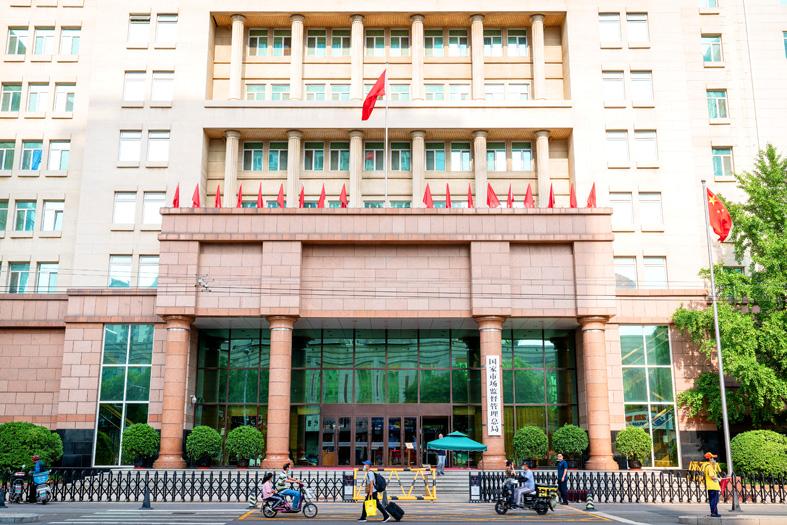China is about to draft new laws on national security, technology innovation, monopolies and education, as well as in areas involving foreigners, the Chinese government said in a document published late on Wednesday.
The announcement signals that a crackdown on industry with regard to privacy, data management, antitrust and other issues would persist throughout the year.
The Chinese Communist Party and the government said in a plan for the five years to 2025, published by the state-run Xinhua news agency, that they would also improve legislation governing public health by amending China’s infectious disease law, and its “frontier health and quarantine law.”

Photo: Bloomberg
China is working for a return to normal after the COVID-19 pandemic, which emerged in Wuhan in late 2019.
Regulations dealing with food and medicine, natural resources, industrial safety, urban governance and transport would also be strictly enforced, the government said.
Authorities aim to develop laws consistent with new sectors, such as the digital economy, Internet finance, artificial intelligence, big data and cloud computing, they said, adding that they would also improve the response to emergencies.
They also laid out directives for the prevention and resolution of social conflicts, and reiterated an order for officials to “nip conflicts in the bud.”
Better legislation in areas such as education, race, religion and biosecurity is also being planned, they said.
The government has over the past few months reined in tech corporations with anti-monopoly or data security rules, and clamped down on tutoring companies, as the state increases its control of the economy and society.
Authorities last month used a law aimed at responding to foreign sanctions for the first time to countersanction former US secretary of commerce Wilbur Ross and other US citizens, and last year imposed a National Security Law on Hong Kong, employing legal means to protect the Chinese government’s interests beyond the mainland border.
The party and the government asserted that a “rule of law government” must follow the party leadership.
Chinese President Xi Jinping (習近平) has made “rule of law governance” a signature of his rule, which would be extended if he seeks a third five-year term next year.

Intelligence agents have recorded 510,000 instances of “controversial information” being spread online by the Chinese Communist Party (CCP) so far this year, the National Security Bureau (NSB) said in a report yesterday, as it warned of artificial intelligence (AI) being employed to generate destabilizing misinformation. The bureau submitted a written report to the Legislative Yuan in preparation for National Security Bureau Director-General Tsai Ming-yen’s (蔡明彥) appearance before the Foreign Affairs and National Defense Committee today. The CCP has been using cognitive warfare to divide Taiwanese society by commenting on controversial issues such as Taiwan Semiconductor Manufacturing Co’s (TSMC, 台積電) investments in the

INVESTIGATION: The case is the latest instance of a DPP figure being implicated in an espionage network accused of allegedly leaking information to Chinese intelligence Democratic Progressive Party (DPP) member Ho Jen-chieh (何仁傑) was detained and held incommunicado yesterday on suspicion of spying for China during his tenure as assistant to then-minister of foreign affairs Joseph Wu (吳釗燮). The Taipei District Prosecutors’ Office said Ho was implicated during its investigation into alleged spying activities by former Presidential Office consultant Wu Shang-yu (吳尚雨). Prosecutors said there is reason to believe Ho breached the National Security Act (國家安全法) by leaking classified Ministry of Foreign Affairs information to Chinese intelligence. Following interrogation, prosecutors petitioned the Taipei District Court to detain Ho, citing concerns over potential collusion or tampering of evidence. The

‘COMPREHENSIVE PLAN’: Lin Chia-lung said that the government was ready to talk about a variety of issues, including investment in and purchases from the US The National Stabilization Fund (NSF) yesterday announced that it would step in to staunch stock market losses for the ninth time in the nation’s history. An NSF board meeting, originally scheduled for Monday next week, was moved to yesterday after stocks plummeted in the wake of US President Donald Trump’s announcement of 32 percent tariffs on Taiwan on Wednesday last week. Board members voted to support the stock market with the NT$500 billion (US$15.15 billion) fund, with injections of funds to begin as soon as today. The NSF in 2000 injected NT$120 billion to stabilize stocks, the most ever. The lowest amount it

NEGOTIATIONS: Taiwan has good relations with Washington and the outlook for the negotiations looks promising, Minister of Economic Affairs J.W. Kuo said Taiwan’s GDP growth this year is expected to decrease by 0.43 to 1.61 percentage points due to the effects of US tariffs, National Development Council (NDC) Minister Paul Liu (劉鏡清) said at a meeting of the legislature’s Economics Committee in Taipei yesterday, citing a preliminary estimate by a private research institution. Taiwan’s economy would be significantly affected by the 32 percent “reciprocal” tariffs slapped by the US, which took effect yesterday, Liu said, adding that GDP growth could fall below 3 percent and potentially even dip below 2 percent to 1.53 percent this year. The council has commissioned another institution